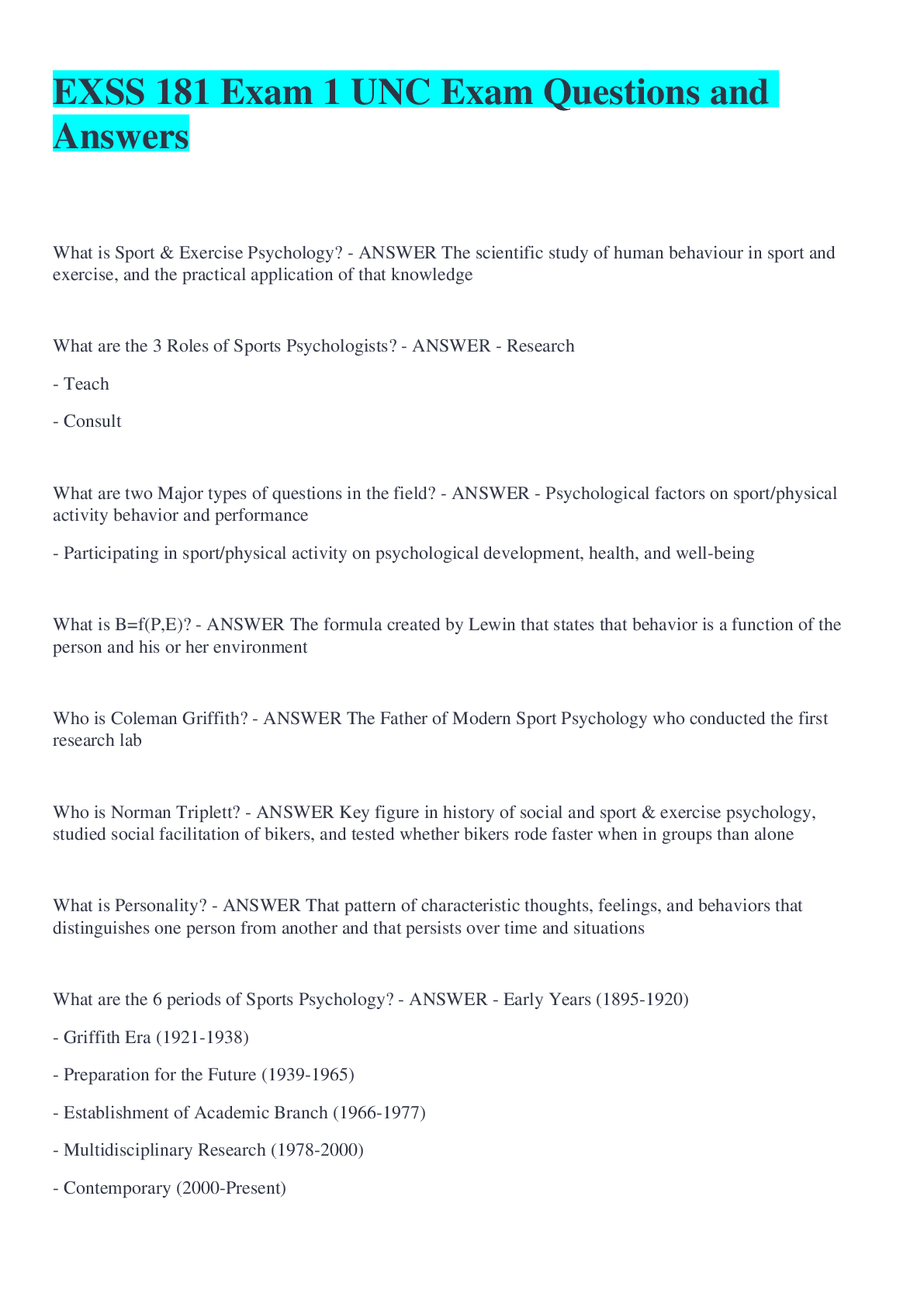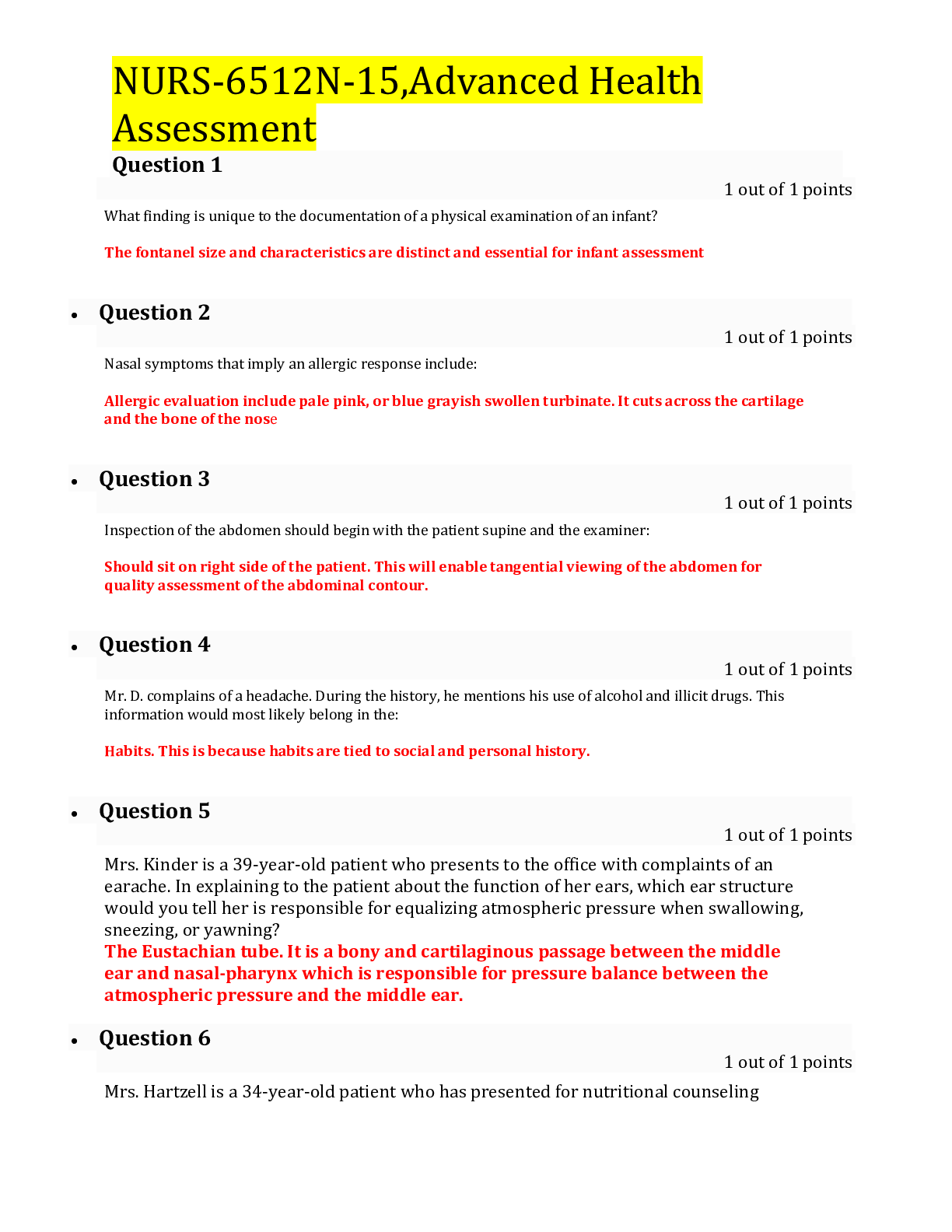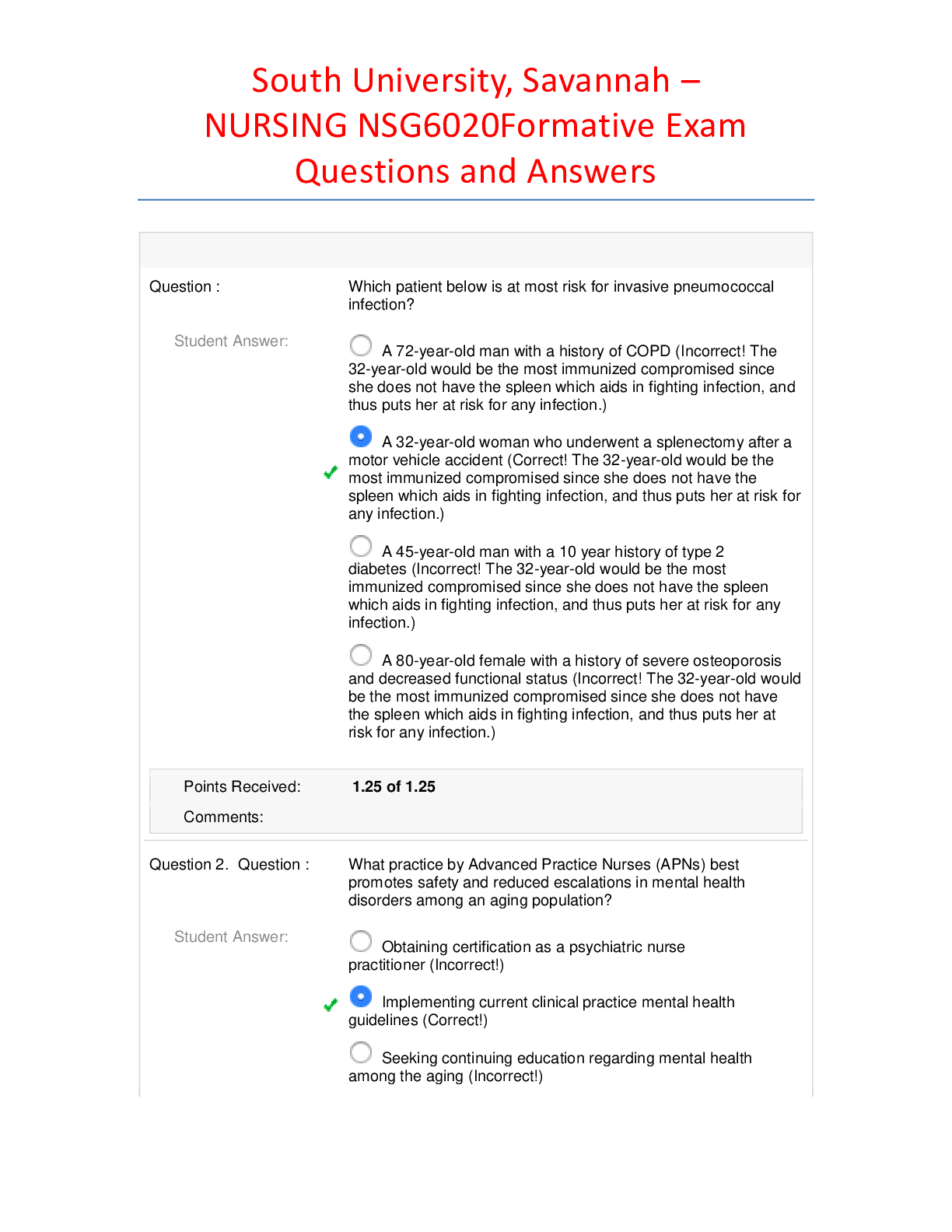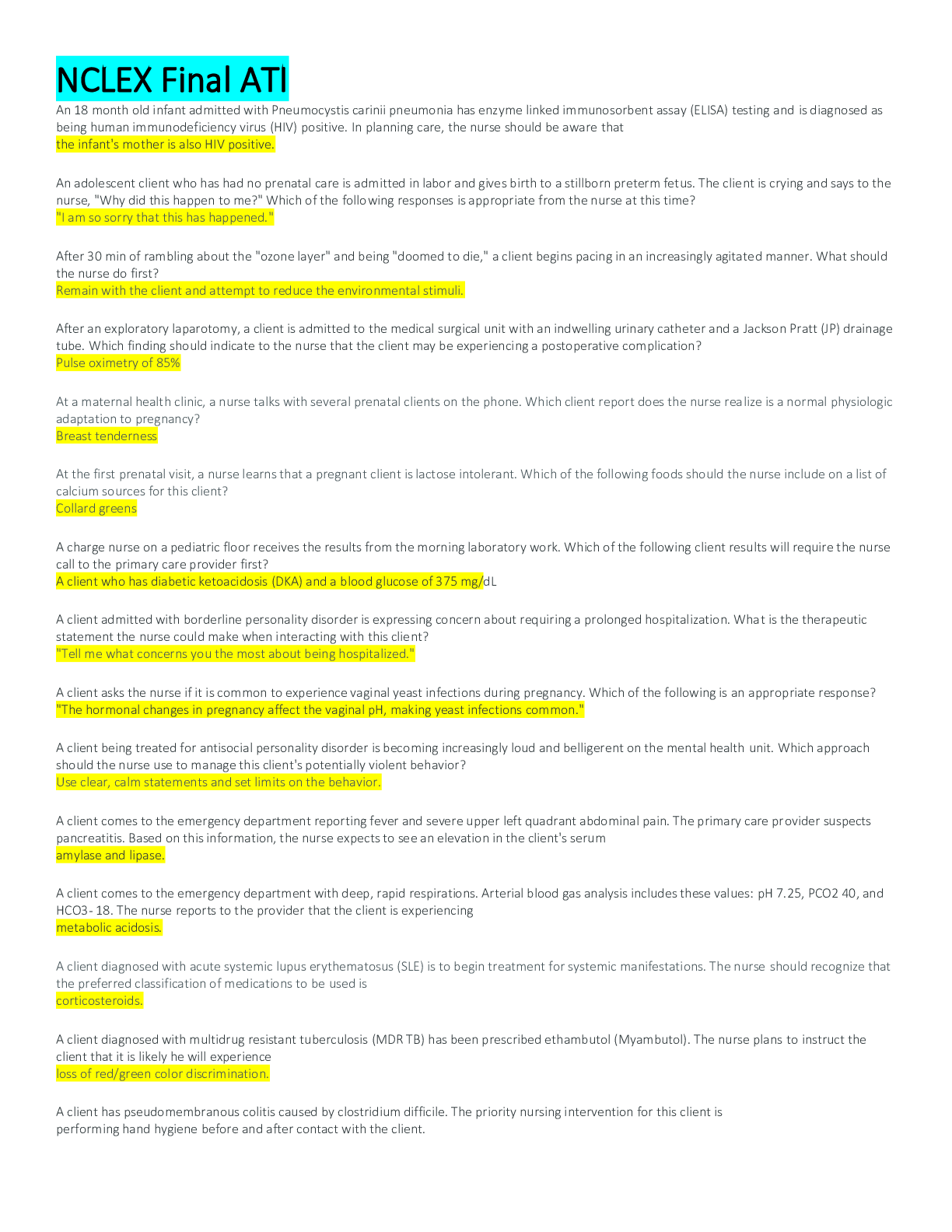EXSS 181 Exam 1 UNC Exam Questions and Answers
Document Content and Description Below
What is Sport & Exercise Psychology? - ANSWER The scientific study of human behaviour in sport and exercise, and the practical application of that knowledge What are the 3 Roles of Sports Psycholog... ists? - ANSWER - Research - Teach - Consult What are two Major types of questions in the field? - ANSWER - Psychological factors on sport/physical activity behavior and performance - Participating in sport/physical activity on psychological development, health, and well-being What is B=f(P,E)? - ANSWER The formula created by Lewin that states that behavior is a function of the person and his or her environment Who is Coleman Griffith? - ANSWER The Father of Modern Sport Psychology who conducted the first research lab Who is Norman Triplett? - ANSWER Key figure in history of social and sport & exercise psychology, studied social facilitation of bikers, and tested whether bikers rode faster when in groups than alone What is Personality? - ANSWER That pattern of characteristic thoughts, feelings, and behaviors that distinguishes one person from another and that persists over time and situations What are the 6 periods of Sports Psychology? - ANSWER - Early Years (1895-1920) - Griffith Era (1921-1938) - Preparation for the Future (1939-1965) - Establishment of Academic Branch (1966-1977) - Multidisciplinary Research (1978-2000) - Contemporary (2000-Present) What are the 3 Ways of Knowing? - ANSWER - Common Sense - Practical Experience - Science What are 4 steps of the Scientific Method? - ANSWER - Develop the problem - Formulate Hypothesis - Gather Data - Analyze and Interpret results What are the 5 approaches to Personality? - ANSWER - Psychodynamic Approach - Trait Approach: Big Five - Situational Approach: social learning - Interactional Approach: B = f(P,E) - Phenomenological Approach: person's understanding of their own environment What is a Trait Approach? - ANSWER - Consistant - Generalizable What are the 2 theories that suggest that the situation influences personality development? - ANSWER - Situation Approaches - Interactional Approaches What is Motivation? - ANSWER The direction and intensity of effort - Direction - approach/avoid or attraction - Intensity - how much effort, persistence What are Attributions? - ANSWER Interpretations or explanations individuals give for success or failure What are the 3 characteristics of Attribution? - ANSWER - Stability - Locus of Causality - Locus of Control What is Self-Bias? - ANSWER Making attributions that help you increase or maintain your self-esteem and confidence What is Learned Helplessness? - ANSWER A psychological state where people have learned that failure is inevitable and out of their control What is the Achievement Goal Theory? - ANSWER - People are motivated to demonstrate competence - Motivation is influenced by the personal meaning one assigns to perceived success and failure What is Task/Mastery Achievement? - ANSWER - Possible for all participants to be successful - Success more in participant's control What is Ego Achievement? - ANSWER - A limited number of people can be successful - Success less in participant's control What are the 4 possible combinations for goal orientations? - ANSWER - High task, low ego - High task, high ego - Low task, low ego - Low task, high ego What are the 2 conceptions of Ability? - ANSWER - Undifferentiated concept of ability * an inability or a choice not to differentiate between ability and effort. - Differentiated concept of ability *a person is able to, and chooses to, differentiate between ability and effort What are the two types of Motivation Climate? - ANSWER - Mastery climate: Emphasis on learning, effort, individual improvement, and cooperation tend to evoke task involvement - Performance (competitive) climate: Emphasis on competition, winning, and social comparison tend to evoke ego involvement What is the Competence Motivation Model? - ANSWER 1. Perceptions of control (over whether one can learn and perform skills) work along with self-worth and competence evaluations to influence motivation. 2. Perceptions of control , competence, self-esteem do not influence motivation directly. 3. Rather, these perceptions influence affective or emotional states (e.g., enjoyment, anxiety, pride, shame) that in turn influence motivation. What are Mastery Attempts? - ANSWER - Sporting Choices - Intensity - Persistence What are the 3 stages of children's competence? - ANSWER - Autonomous Competence - Social Comparison - Integrated Stage What is Arousal? - ANSWER A general state of activation from deep sleep to extreme excitement What is Anxiety? - ANSWER A negative emotional state characterized by nervousness, worry, apprehension and increased physiological activation What is State Anxiety? - ANSWER The actual apprehension and tension felt at a given time (in the moment) What is Trait Anxiety? - ANSWER The tendency to become anxious in stressful situations(dispositional) What is Cognitive Anxiety? - ANSWER The Mental component of Anxiety What is Somatic Anxiety? - ANSWER The Physiological component of Anxiety What are the two ways that anxiety affects performance? - ANSWER - Increased muscle tension and coordination difficulties - Attention and concentration changes What is the Drive Theory? - ANSWER The idea that the relationship between anxiety and performance is direct and linear What is Stress? - ANSWER A relationship between the person and the environment that is appraised as taxing or exceeding the resources of the person and endangers his/her well-being What is Cognitive Appraisal? - ANSWER An evaluation of whether the encounter has significance for the person's well-being What is Primary Appraisal? - ANSWER What is at stake? What is Secondary Appraisal? - ANSWER What can be done? What is Coping? - ANSWER Constantly changing cognitive and behavioral efforts used to manage specific external and/or internal demands that are appraised as taxing or exceeding the resources of the person What is Problem-Foucused Coping? - ANSWER Efforts directed at changing the transaction What is Emotion-Focused Coping? - ANSWER Efforts directed at changing the emotional response without changing the transaction What are the key components of the Sport Competition Process? - ANSWER 1) Objective Competition Situation 2) Subjective Competition Situation 3) Response 4) Consequences Whats is Objective Competitive Situation? - ANSWER Standards are set by: 1) An individual's past performance 2) An idealized performance 3) Another individual's performance What is Subjective Competitive Situation? - ANSWER Individual's perceptions, interpretations, and appraisals of the competitive situation What is Response? - ANSWER Whether an individual approaches a competitive situation and how he or she does so What is Consequence? - ANSWER The longer-term effects/outcomes of the competitive process What is Competition? - ANSWER A social process that occurs when rewards are given to people on the basis of how their performances compare with the performances of others doing the same task or participating on the same event What is Cooperation? - ANSWER A social process through which performance is evaluated and rewarded in terms of the collective achievements of a group of people working together to reach a particular goal What is Modeling? - ANSWER the cognitive, affective, and behavioral changes that result from observing others What are the 3 types of Modeling effects? - ANSWER - Skill/behavior acquisition - Psychological responses - Response facilitation (behaviors already learned) What are the 4 key components of the model process? - ANSWER - Attention - Retention - Motor Reproduction - Motivation What are the 4 primary ways to measure degrees of learning? - ANSWER - Verbal production - Recognition - Comprehension test - Actual performance What is a positive reenforcement? - ANSWER Increases the likelihood of a behavior that precedes it What is a Negative reenforcement? - ANSWER Decreases the likelihood of a behavior that precedes it What is a Positive Approach? - ANSWER - Strengthens desired behavior by motivating participants to perform or exhibit them, and by reinforcing the behaviors when they occur - Focuses on correct performance - Praise, encouragement, and instruction are key elements What is a Negative Approach? - ANSWER - Attempts to eliminate undesirable behaviors through punishment and criticism - Focuses on performance errors or negative behaviors - Fear of failure is a key problem What is Intrinsic Motivation? - ANSWER - Behaviors demonstrated voluntarily, in the absence of constraints imposed by others - Performing an activity for its own sake What is Extrinsic Motivation? - ANSWER Behaviors displayed for the purpose of achieving some end and not for its own sake What are the 2 aspects of Cognitive Evaluation Theory and Rewards? - ANSWER - Controlling Aspect - More controlling = undermine intrinsic motivation Affects autonomy perceptions - Informational Aspect - More informational = enhance intrinsic motivation Affects competence perceptions [Show More]
Last updated: 2 years ago
Preview 1 out of 7 pages

Buy this document to get the full access instantly
Instant Download Access after purchase
Buy NowInstant download
We Accept:

Reviews( 0 )
$7.00
Can't find what you want? Try our AI powered Search
Document information
Connected school, study & course
About the document
Uploaded On
Oct 01, 2022
Number of pages
7
Written in
Additional information
This document has been written for:
Uploaded
Oct 01, 2022
Downloads
0
Views
47
























.png)

